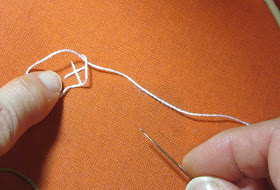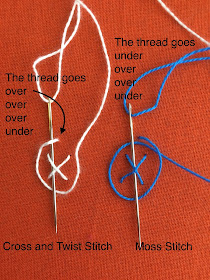It is often called Kokedera, which would be 'Moss Temple' in English.
Read more about Saiho-ji, the regulations for entering, and look at pictures of the green 'carpet' here.
Now for the stitch. I found Moss Stitch in A - Z of Embroidery Stitches 2. For those who have this book and can compare, you find that I have experimented with how to loop the thread, as you can see in my pictures below:
First make a cross stitch.

Take the thread out above the cross.
Twist the thread around your finger to make a loop :
Place the loop around the cross.
Insert the needle under the cross, but don't bite any of the fabric.
Pull the loop tight till you have a knot, and insert the needle below the cross to anchor.
You have made one Moss Stitch.
Make a zillion more and you have a moss carpet as lush as those of a Kyoto temple garden.
This is my 'Aida Moss Garden'!
Updated later:
As far as I know there is no Swedish name for this stitch.
Mattia, who always helps to find French names for the stitches, points to the French translation of Mary Thomas's Dictionary of Embroidery Stitches, where there is a stitch called Point de Croix Bouclé.
I had a look in my MTDoES in English. There is no stitch under the name Moss Stitch, but a similar looking stitch called Cross and Twist Stitch.
However, the knot is made differently.
Have a look:
The Cross and Twist Stitch is far easier to make! I wish I had seen it earlier! Thank you, Mattia, for pointing me in this direction!
Homework:
1) You need to make a new Reference Chart as the first is filled with Stitches 1 - 42
2) On a red background make a moss garden with linen thread.











This looks great with the green thread. In black or brown I think it would look like some kind of creepy crawly bug.
ReplyDeleteYes, I thought that, too!
DeleteBonjour,
ReplyDeleteJ'ai trouvé ce point dans le "Marie Thomas" sous le nom de
- point de croix bouclé
Merci et à bientôt
Mattia
First here is the French text put into English by Google Translate:
DeleteI found this point in the "Marie Thomas" under the name of
- Curly cross stitch
Thank you and see you soon
My reply to Mattia is:
Are you sure this is the same stitch? In Mary Thomas's book there is a stitch called Cross and Twist Stitch, but the knot is made differently. I will update the post and clarify.
Interesting stitch, Queenie, which looks good in a line. I imagine there are a lot of other ways that would work too. The sampler is a good way of recognizing each stitch at a glance.
ReplyDeleteI enjoyed the Japanese trip though felt a bit hungry toward the end.lol
Pamela saw 'spiders', I see star shaped moss, or stars in the sky, or just beautiful shapes. Making the Moss Stitch is as meditative, time demanding and repetitive as copying the Buddhist sutras with brush and ink is in Saito-ji Temple! Yes, both activities make you hungry, but the moss IS stunningly beautiful.
DeleteAnother great stitch for experiments. I've used this stitch on a few projects with different threads.
ReplyDeleteOne problem with knotty stitches are that if you need to unstitch, it takes a lot of time and patience!
DeleteFull of possibilities! Texture is always a fascinating consideration..
ReplyDeleteI am enjoying doing my homework with the green linen thread - haven't used linen in a long time. It has such a beautiful sheen.
DeleteInteresting to see the different versions.
ReplyDeleteYes, I wonder which came first. Was the difficult version (Moss) simplified into the easy one (Cross and Twist) or...? Or are they two totally different stitches without any connection?
DeleteSomehow this reminds me of Friday when I was teaching scouts to tie a bowline ... the rabbit comes up out of the hole, around the tree, and back down through the hole.
ReplyDeleteScouting and nautical knots, I guess most of them need to be firm and hold tightly whatever is tied up. In embroidery knots are mainly decorative, and the firmer, the more difficult to correct a mistake. Unpicking a line of Running Stitch is easy, but removing a set of Moss Stitch would be a nightmare!
Delete